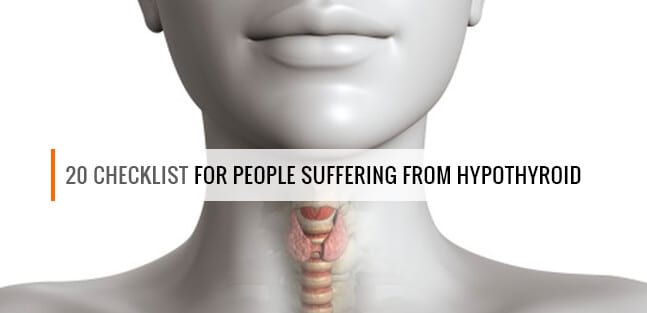Health, Nutrition, Weight Loss
20 Checklist for People Suffering from Hypothyroid
What Is A Thyroid Gland?
The thyroid gland is the largest gland in the endocrine system.
The shape of the thyroid gland is of a butterfly and it is located in the neck. It produces 3 hormones: Thyroxine (T4), Triiodothyronine (T3) [routinely counted as thyroid hormones] and Calcitonin.
Excess or lack of thyroid hormones can impact metabolism in different ways.
Hypothyroid
Hypothyroidism is the condition for weight gain due to thyroid. It is very common among adults,1out of 10 suffer from hypothyroid. Know more about inter-relationship of thyroid and weight and foods to avoid in hypothyroidism.
If you are suffering from hypothyroidism consult a Possible nutrition coach for FREE.
Checklist for Hypothyroid clients
- Thyroid problems include hypothyroidism – low levels of thyroid hormone; hyperthyroidism – high levels of
thyroid hormone; and thyroiditis – inflammation of the thyroid gland. - Eating a healthy diet that ensures adequate intake of essential vitamins and minerals while avoiding foods
that adversely affect the thyroid, it helps to support healthy thyroid function. - Get the thyroid levels checked once in every 2-3 months and adjust the dosage accordingly by consulting
with an endocrinologist. For optimum thyroid function, one must be on correct dosage and it depends on
the type of thyroid medication. - If you have any of these symptoms like fatigue, weight gain, constipation, dry skin, brittle hair and nails,
heavy/irregular periods, puffy face, feet and hands, you need to check with your thyroid levels and should
consult an endocrinologist. - Your diet should include foods rich in Zinc, Iron, Copper and Selenium. Selenium helps to produce and
regulate T3 hormones. - Selenium rich foods are sunflower seeds, sesame seeds, onions, fish, eggs, mushrooms, brown rice and
other whole grains. - Include good fats in the form of flaxseeds, walnuts which consists of omega-3 fatty acids.
- Chamomile tea is a herbal tea which has medicinal effects and is helpful in the treatment of stress, anxiety,
constipation and hypothyroidism. Drink herbal tea in between meals to improve the production of
hormones. - Cruciferous vegetables like cabbage, cauliflower, broccoli, radish, millets, peanuts, sweet potato contain
goitrogens, substances that interfere with thyroid function. Eat them in moderation in cooked form as
cooking will lower the effect of goitrogens in these foods. - Vitamin D has to be taken from the fifth day of your detox diet as vitamin D plays an important role in
thyroid function and weight loss. 90 percent of the population are found to be deficient hence, its mandatory to take the supplement. You can also get the vitamin D lab test done if you wish to. - About 150 mcg of Iodine/day is required for proper thyroid function as it is a component of thyroid
hormone. Use Iodized salt such as Tata salt plus which is fortified with Iodine & Iron. Sources of iodine
includes sea food, eggs, cheese and other dairy products, green leafy vegetables, apple, dates and iodized
salt. - As these foods have important health benefits so, if you have uncontrolled or fluctuating thyroid hormone
levels and also iodine deficiency, then you should restrict on them. - Soy products should be restricted.
- Herbal supplements like Guggulu and Trikattu will boost the metabolism and improve thyroid function.
Take 1 tab of Guggulu with warm water after your meals from the second month of your programme.
Trikatu can be included after consulting with your ayurvedic doctor. - Weight gain in hypothyroid clients is not always related to fat accumulation, but also it is due to excess
accumulation of salt & water. So, reduce the intake of salt in the diet. - Maintain the TSH Levels of 2-3 micro IU/ml for better weight loss.
- Workout regularly like doing cardiovascular, strengthening and flexibility exercises along with simple exercises for thyroid that will help in weight loss and better thyroid function. You can check on youtube for more information
- Avoid taking stress, try some stress management techniques by making simple lifestyle changes and you
can also try a mind-body therapy, such as yoga or meditation. This technique helps to slow down the
breathing, and also helps you to get a good sleep. - It is important to start and continue with the thyroid medication Thyronorm or Eltroxin as suggested by the
physician, and have it on empty stomach and maintain a gap of minimum 30 minutes before you have the
first meal. - Take tests to check for mineral deficiencies like Serum Ferritin and Vitamin-B12. Other tests that are
required are – the complete Thyroid profile and Lipid profile. - Discuss in detail with your dietician regarding your past medical history and set your expectations right
from the beginning.
Download the PDF version here!

very healthy advice..
Thank you Sharmila
Soya Product should be stopped compltely?For Vegetarians there are very minimum options for Protiens.Please advice.
Hi Bhagyajyothi,
It is found that one of the soy isoflavones, Genistein aglycone, has been reported to be potentially harmful to thyroid function, especially when the diet is lacking iodine. Hence, it is recommended to avoid soy products in case of hypothyroid. For other protein sources for vegetarians include Whole grams such as whole green gram, bengal gram, Rajma, Black gram, cow peas, dals such as mung, urad, channa etc. To find other sources of protein you can check out this https://truweight.in/blog/food-and-nutrition/protein-rich-food.html